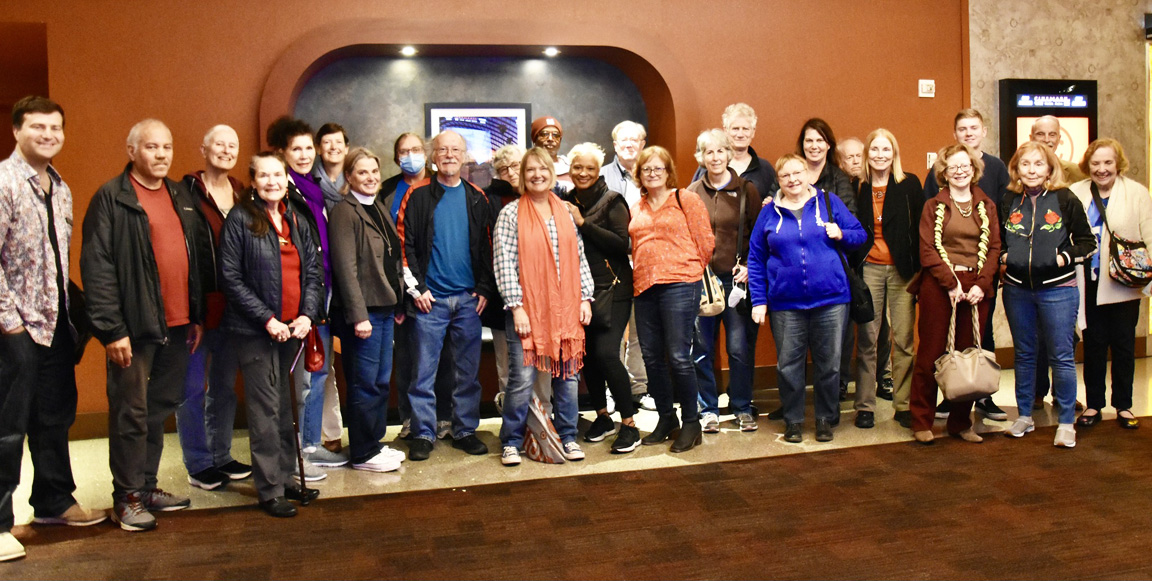
Parishioners from St. Bede’s Church, Mar Vista (Los Angeles), with a few friends from All Saints, Beverly Hills – home parish of film director Brian Ide – turn out for the Jan. 23 debut of “A Case for Love.”
[The Episcopal News] Unselfish love is an antidote for the divisions ailing society, said some Episcopalians from the Diocese of Los Angeles after attending the one-day Jan. 23 screening of A Case for Love, a feature-film documentary inspired by the teachings of Presiding Bishop Michael Curry.
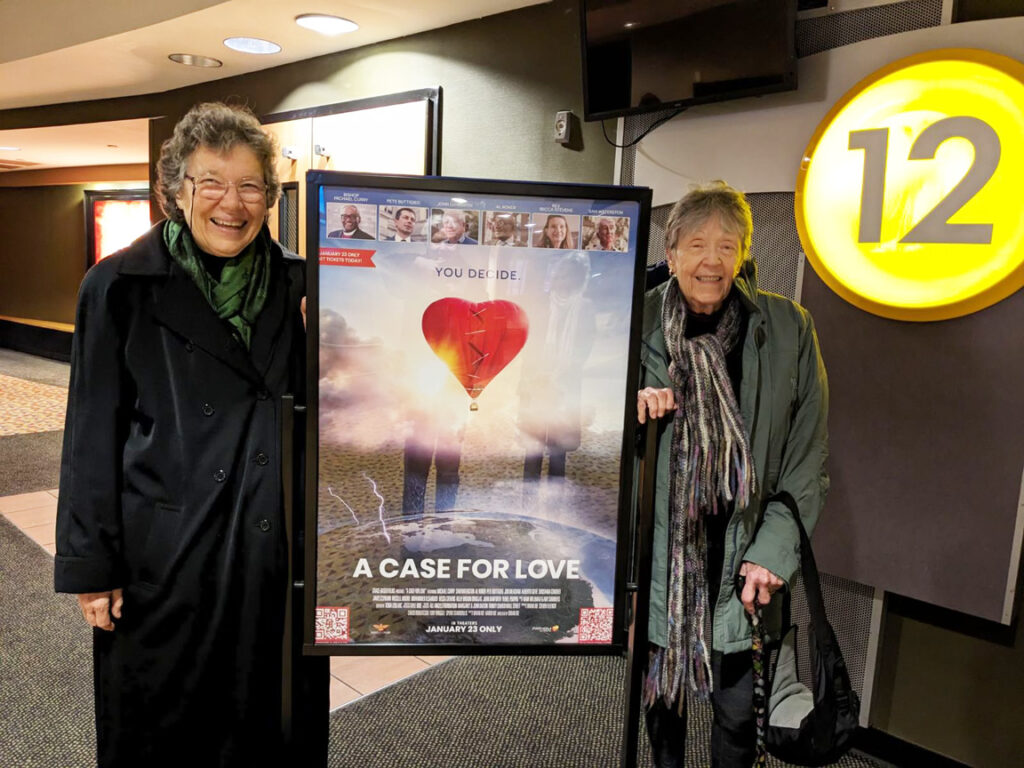
Canon Serena Beeks, left, and Canon Merrily Dunlap – former commissioners of schools for the Diocese of Los Angeles – pose with the “A Case for Love” poster at a New York screening. Courtesy photo
“Yes, saying yes and choosing to be kind makes you kinder all the time,” said Canon Serena Beeks, retired executive director of the diocesan Commission on Schools, in a telephone interview from New York City, where she viewed the film.
“If you can bring one person along every now and then, it helps. But it’s one person at a time. That is how movements start, but it’s not fast, certainly not at the beginning, so we have to persevere,” added Beeks. “What’s the alternative? We can be selfish. But let’s not. That’s not much fun. Let’s give it a shot.”
“A Case For Love poses an explicit, scary question – has love lost the battle? – and answers with a resounding no, especially when it comes to those living everyday lives, caring for those around them or receiving self-sacrificial love,” said Bishop John Harvey Taylor, who attended the evening screening at the Santa Anita Mall in Arcadia. “We all see the love in those families, and indeed in our families. It comes naturally. Bishop Curry’s prophetic call is to understand at last that the health of our culture and politics, even our survival as a nation, depend on finding a new civic vocabulary rooted in love and our obligation to our neighbor. This wonderful film deepens my belief that if this shift is to occur, the Episcopal Church will be in the lead.”
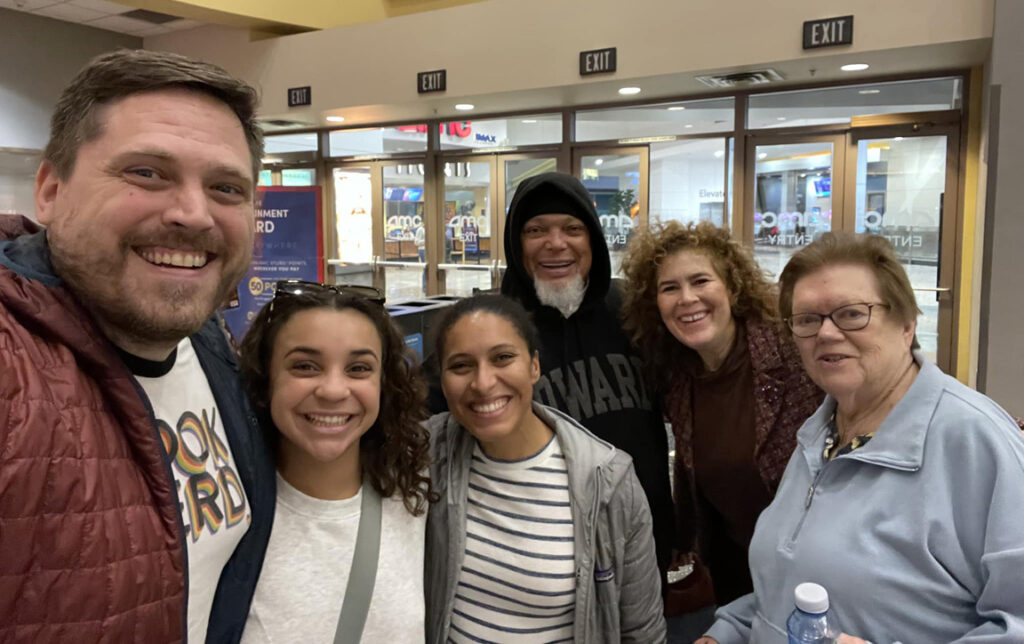
Members of St. Barnabas’ Church, Pasadena, attend the screening. Photo from Facebook.
Produced by Grace-Based Films, a company formed by parishioners of All Saints Church in Beverly Hills, “A Case for Love” included interviews with “ordinary people doing ordinary to extraordinary things,” director Brian Ide says in the introductory moments of the film. “We wove those stories into seven chapters with universal themes; stories like answering the call, or exclusion, or being dealt a difficult hand in life, or love and loss – themes that many of us can resonate with.
“We also interviewed over 200 people that were just ‘man on the street’ interviews where we pulled over on the side of the road in downtown Cincinnati or Minneapolis or Nashville, the Brooklyn Bridge, small farms in Pennsylvania, and we asked people what’s the first thing that comes to mind when you hear the words ‘unselfish love?’”
Also featured were prominent politicians like U.S. Transportation Secretary Pete Buttigieg and South Carolina U.S. Representative James Clyburn; notable clergy, including Curry, as well as the Rev. Kelly Brown Douglas, canon theologian of the Washington National Cathedral and interim president of Episcopal Divinity School; and those in the arts and letters, such as actor Sam Waterston, NBC weathercaster Al Roker and historian Jon Meacham.
“There’s that Hallmark card kind of love,” Roker says to Curry in an introductory segment. “But this is the kind of love that takes work. That takes digging in and sometimes getting uncomfortable with that because anything worthwhile is going to be hard work.”
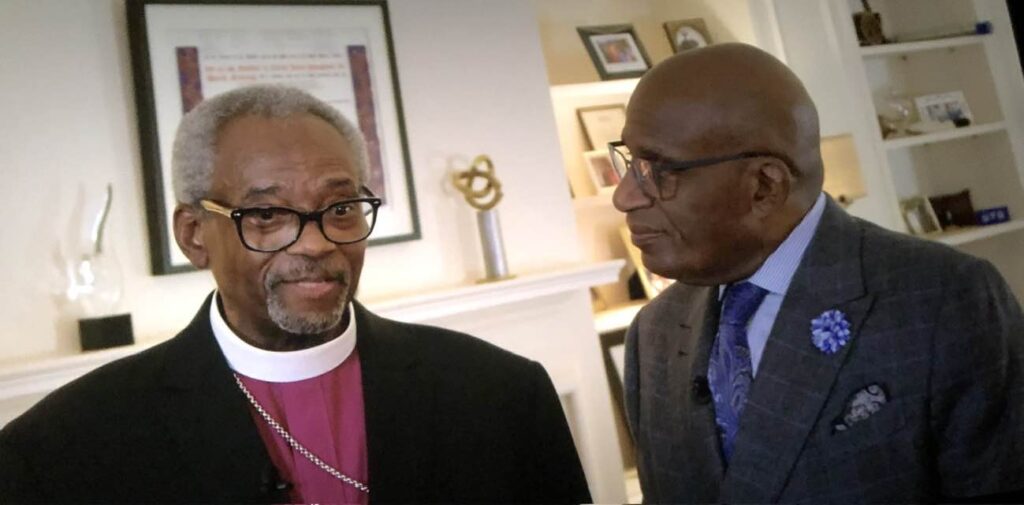
Presiding Bishop Michael Curry and TV host Al Roker speak in an introduction to “A Case for Love.” Photo: Screenshot by John Taylor
Near the end of the film, Curry said, “I was raised to believe that we’ve been put on this earth to make it better … to continue God’s work of creation, of creating a world that we can all say this is good.
“We didn’t get here overnight and we’re not going beyond here to a new day that reflects our deepest dreams overnight either,” he said, but added that each person can get involved. “I used to tell folk when I was a parish priest, we can’t do everything, but we can do something, so let’s do the something that is the most good we can do. We’re not God. We’re who we are. I’m Michael. What is the greatest good that Michael can bring and do? Maybe that’s enough to make it, one step at a time, one day at a time, one moment at a time, one life at a time.”
The film explores such topics as racial justice, sexual identity, military service, foster care, politics, sexual trafficking, disability, loss of loved ones, refugees, volunteering, food justice and more.
“It begins here, what I try to live by; don’t withhold from another that which you would not want withheld from yourself,” Brown Douglas said. “If you want respect, don’t withhold it from another. Do you want to feel safe, anytime you were out of your home and on the streets, then don’t withhold that. Do you want enough food to eat, a decent home, equal opportunities, then don’t withhold these things – decent health care – from one another.”
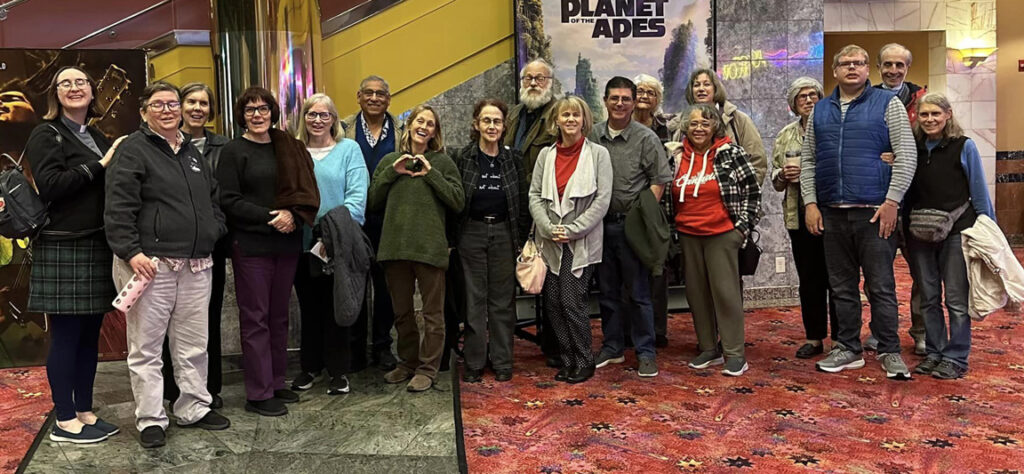
Members of Episcopal and Lutheran churches join the audience at a Camarillo theater showing “A Case for Love.” Photo from Facebook
Canon Suzanne Edwards-Acton, chair of the diocesan Program Group on Black Ministries, contacted after the screening, agreed that unselfish love can be the antidote to society’s ills, “but we can’t mandate unselfish love, and our society is full of selfish people.”
Rather, she said, required truth-telling about the nation’s history and laws; “that’s the antidote, because we can’t be trusted to center unselfish love. Our propensity for greed and selfishness is real and the most loving thing we can do is tell the truth about that propensity and center everything around that truth.”
While truth telling and confession are necessary, Curry said in the film in response to an interview question about the church acknowledging the pain it has caused, they don’t go far enough.
“Confessing isn’t enough. You’ve got to do something. You learn from that path. You turn and then you work together to build a new future where, as ex slaves used to say there’s plenty good room for all God’s children. That’s the Christian religion I’m about.”
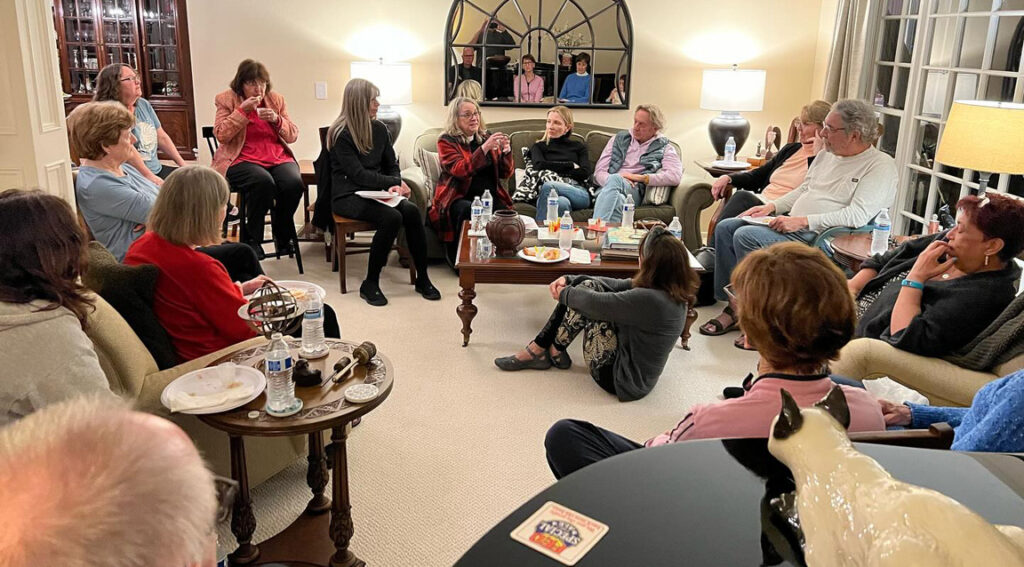
Members of Church of the Epiphany, Oak Park, gather for pizza and conversation after attending a screening. Photo from Facebook
A call to action: intentional love
At the end of the film Bishop Curry issues a call to action, asking viewers to participate in 30 days of intentional love and record them in a journal that may be downloaded from the movie’s website. “Acts create habits and habits create change and the world desperately needs change,” said Ide, the film’s director.
Free resources, including discussion guides for adult education and youth groups, communications tools, social media files and posters, can be downloaded at the same website.
The Rev. Guy Leemhuis, vicar of St. Luke’s of the Mountains Church in La Crescenta said members have been so inspired by the movie that “we’ve started calling ourselves the Love Church so that others know in doing so, we can live into that incarnational reality,” he said. They’re excited about the streaming opportunity and study guide to follow, he said.
“We are definitely going to try to implement the 30 days of unselfish love acts,” he added. “I am absolutely convinced unselfish love is the key to transform our society from one of intolerance and scapegoating our fellow neighbors to realizing God’s dream that we love one another. Love conquers all. Let’s be in it to win it.”
“Jesus is love, so it helps us to let all in our community know we are a place of love and welcome to all. Jesus beckons us to demonstrate this unselfish love in the world. I’m excited, as I think will be anyone who has an opportunity to watch and internalize the message of love.”
In San Gabriel, where Church of Our Saviour members had already committed to the film’s call to action, the Rev. Jeff Thornberg, rector, said members were moved to tears with “the anecdotal stories of love in action set next to Bishop Curry’s inspired theology.
“Going into the movie, a few were wondering whether a general appreciation for ‘love’ as an antidote to the problems of the world was a simplistic solution, but felt that the movie portrayed a transformational depth of theology, but more than that, theology in action.”
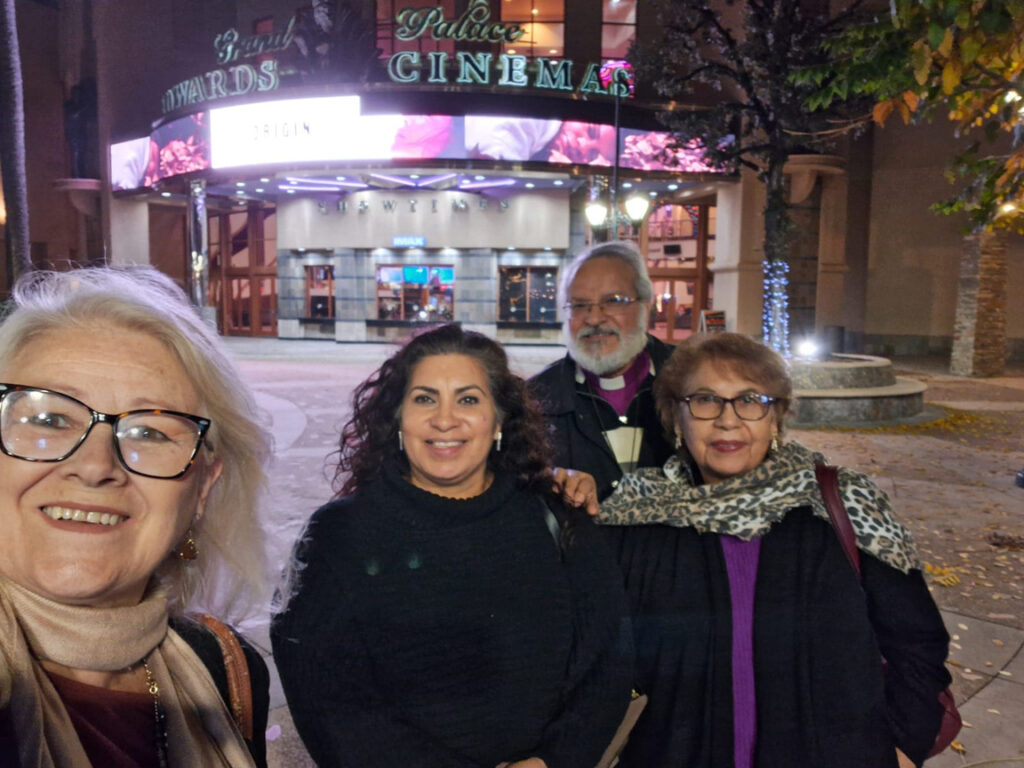
Bishop Naudal Alves Gomes (at back), former archbishop and primate of Brazil, now serving at St. Mark’s, Van Nuys, and St. Simon’s, San Fernando, attends a screening with family and friends. Photo from Facebook
He added: “The decision to love, and more specifically act in loving ways that center not on self but on the other is, and perhaps has always been, the antidote to the inherent brokenness of the human condition that leads to the systemic division and brokenness of our world.”
For Gretchen Malcolm, a parishioner at St. Margaret’s Church in San Juan Capistrano, while some of the personal stories of hardship and loss were difficult to watch, the film “teaches us that love can be shown in the smallest ways, by doing kind things. Love will transform everyone, no matter what they’re going through.”
The Rev. Melissa Campbell Langdell, rector of All Saints Church in Oxnard, wanted to hear more about “when love becomes costly, how do we keep loving? It was a good conversation starter and I hope we can all build on its message and share how our communities and individuals are acting with unselfish love.”
Kay Alexander, a parishioner at St. Mark’s Church in Upland, said the movie’s important message needs to be shared even more widely. “The diversity of the people interviewed stood out to me,” she said. “I probably won’t journal but will try to remember daily to spread love.”
Hailey Johnson, 16, whose family attends St. Mark’s, said she especially liked the part about an older couple who adopted three girls from Korea. The father admitted to having been raised in “somewhat racist” household, but he actively shed those beliefs to welcome the children into his life. That, Hailey said, was unselfish love.
The Rev. Julie Morris, pastor of Mount Cross Lutheran Church in Camarillo, said she viewed the film with ten people from her church and was inspired by the variety of stories they documented.
“I’m convinced that noticing and telling the stories of unselfish love we witness and participate in is a needed antidote for despair,” she said. “The film reminds us that we can all start where we are to practice unselfish love. Like Bishop Curry said, ‘We’re here to make the world a better place.’”
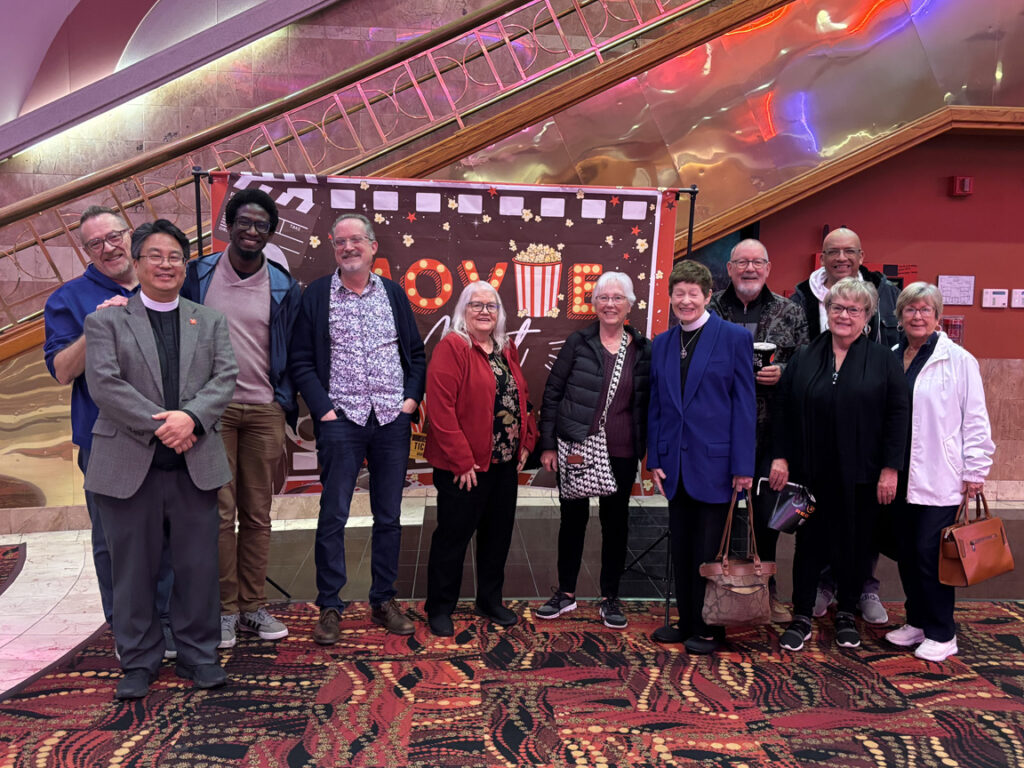
Members of St. Mark’s, Upland, attend a screening in La Verne. Photo: Facebook
“I found a couple of the stories particularly moving – the woman whose life was completely changed after having been sex-trafficked as a child, and the family who helped the pregnant immigrant woman and her children,” said Becky Riley, also of Mount Cross Church. “The message that came through, I believe, was simple – be kind and caring at every opportunity. Don’t worry that you can’t do it all, just do what you can every day. Also, it felt hopeful, which is not a feeling that one gets from the news.”
While encouraged by the film’s message of love, Cynthia Kartman, a member of St. Clement by-the-Sea Church in San Clemente, expressed mixed feelings about the film. “Evangelism makes me very uncomfortable. There are so many people who are using their version of Christ to push people away from the church and from Christ.”
Susan Stewart, a member of St. George’s Church in Laguna Hills, said the film did not address “what do you do when it’s very hard to love somebody and how to maintain a loving relationship when someone is unloving.”
The Rev. Canon Susan Russell said that she will add links to the film’s discussion guide to the web page for the diocese’s Engagement Across Difference initiative, which she leads. They also will create a small-group Lenten study curriculum for use by groups and congregations.
“There is no better antidote to the anxiety, polarization and division that dominates our civic discourse than coming together to share the inspiring witness of those making a case for love in the face of hate,” said Russell, “a case for peace in a time of war, a case for hope in the wake of despair. And there is no better time to come together than during Lent.”
